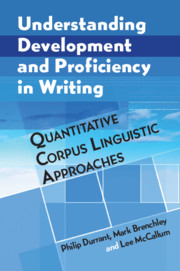Book contents
- Understanding Development and Proficiency in Writing
- Understanding Development and Proficiency in Writing
- Copyright page
- Contents
- Figures
- Tables
- Acknowledgements
- 1 Introduction
- 2 Theoretical and Methodological Foundations
- 3 Development in Syntax
- 4 Development in Vocabulary
- 5 Development in Formulaic Language
- 6 Development in Cohesion
- 7 Conclusions
- References
- Index
2 - Theoretical and Methodological Foundations
Published online by Cambridge University Press: 26 February 2021
- Understanding Development and Proficiency in Writing
- Understanding Development and Proficiency in Writing
- Copyright page
- Contents
- Figures
- Tables
- Acknowledgements
- 1 Introduction
- 2 Theoretical and Methodological Foundations
- 3 Development in Syntax
- 4 Development in Vocabulary
- 5 Development in Formulaic Language
- 6 Development in Cohesion
- 7 Conclusions
- References
- Index
Summary
This chapter establishes a theoretical and methodological foundation for the quantitative corpus linguistic study of writing development. First, it defines and discusses the central constructs of writing, writing proficiency, development, and quantitative corpus linguistics. Second, it sets out four assumptions on which, we argue, quantitative corpus approaches rest and discusses in detail both the strengths of these approaches and the methodological challenges they need to confront. Third, it gives a detailed discussion of specific methodological issues related to defining and measuring key variables of development and context and of establishing the status of particular measures of language use. Finally, the chapter reviews one particular quantitative corpus linguistic approach (multidimensional analysis) which raises important questions about quantitative corpus linguistic methodology as a whole.
Keywords
Information
- Type
- Chapter
- Information
- Understanding Development and Proficiency in WritingQuantitative Corpus Linguistic Approaches, pp. 14 - 55Publisher: Cambridge University PressPrint publication year: 2021
